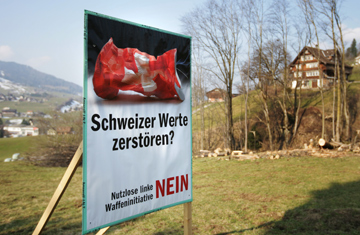
A sign that reads, "Destroying Swiss values? No to the useless guns initiative," stands in the Swiss village of Alt St. Johann on Feb. 13, 2011
Perhaps the great paradox of peaceful and safety-conscious Switzerland, which hasn't been under military threat since World War II, is its cherished tradition of a gun in every closet. And, as the defeat of a Feb. 13 initiative seeking to tighten the nation's liberal gun law proves, the Swiss are not willing to bid a farewell to arms anytime soon.
Early polls in the midst of what was a heated and contentious campaign predicted victory for the anti-gun lobby, but on Sunday, 56.3% of voters rejected the proposal to ban army rifles from homes. With between 2.3 million and 4.5 million military and private firearms estimated to be in circulation in a country of less than 8 million people, Switzerland trails behind only the U.S. and Yemen in the number of guns per capita.
The initiative, launched by center-left parties, church groups and women's groups, as well as other anti-gun organizations, called for legislation requiring that soldiers and those who have completed their military service store their firearms in army depots rather than in their homes, as has been customary for hundreds of years. It also called for the establishment of a national, rather than cantonal, gun registry and for a ban on the sale of fully automatic weapons and pump-action rifles.
The government urged voters to turn down the proposal, arguing that the existing laws regulating the sale, ownership and licensing of private guns — which include a ban on carrying concealed weapons — are stringent enough. Also, since 2008, all army — but not private — ammunitions are required to be stored in central arsenals.
But the initiative's authors claim that the wide availability of weapons is a factor in the estimated 300 gun crimes committed in Switzerland every year. According to Martin Killias, professor of criminology at the University of Zurich, who has conducted extensive research on this topic, that figure includes rates of family shootings and suicides by firearms that are among the highest in Europe. "I believe that if the initiative was accepted and the guns would have to be deposited in arsenals, gun violence would decrease," Killias says.
"A significant number of suicides [in Switzerland] involve a gun," says Ebo Aebischer, a Reformed Church minister who works with families of suicide victims and who belongs to one of the anti-gun committees behind the initiative. He points out that in 2010, nearly 27% of men who committed suicide used a gun; in about half of those cases, the weapon was military-issue. "That's why everybody should have been supportive of this initiative," he adds.
Opponents of the initiative claim that if someone is intent on committing suicide, he or she will resort to any method; a 2006 University of Zurich study showed that between half and two-thirds of people who committed suicide and were at first unable to access their method of choice opted for another. The pro-gun groups also argue that statistics have to be put in perspective, pointing out that with 75 million rounds of ammunition being fired every year in Switzerland during military and civilian target practice, a total of 300 or so suicides or criminal shootings is extremely low. They also say that despite the high number of firearms in the country, government figures show that the rate of gun murders is relatively low — only 24 in 2009, or about 0.3 gun homicides per 100,000 inhabitants. By comparison, the U.S. rate in 2007 — the most recent available figure — was 4.2 per 100,000 people.
"This whole discussion about suicide figures and violence in households was a very insidious trick," says Hermann Suter, vice president of proTELL, Switzerland's gun lobby, aptly named after the country's legendary apple shooter, William Tell, who used a crossbow to target enemies long before firearms were invented. Suter says the initiative was a conspiracy by "socialist and neo-Marxist groups to destroy our army and all the shooting traditions."
In fact, the gun-in-every-closet tradition has been the cornerstone of Swiss national identity for generations. It is tied to the long-held belief that enemies could invade the tiny nation fairly quickly, so every citizen-soldier has to be ready to defend his country. To this day, all Swiss men between the ages of 18 and 30 are required to do three months of military service, followed by annual refresher courses. Firearms are used in compulsory and recreational target practices, so it is not unusual to see civilian men and women, as well as soldiers, with rifles slung across their shoulders, on bikes, buses or trains. In some shooting clubs, children as young as 12 learn sharpshooting and go on to participate in youth rifle competitions around the country. Much of this tradition is based on trust the government places in its citizens to act responsibly. "We feel it's our patriotic and civic duty to use the guns wisely," Felix Endrich, a spokesman for the Swiss Armed Forces, told TIME in 2007, when the discussion of launching an initiative first started.
While the opponents of the initiative rejoice at Sunday's outcome, its supporters are not yet ready to give in. Church minister Aebischer vows that the anti-gun groups will use Switzerland's system of direct democracy, which allows citizens to propose a modification of the Constitution or challenge legislative decisions, to force another vote. "We will be proposing a professional [rather than conscript-based] military," he says. "If successful, such an initiative would fulfill the demands of the current one: army weapons would no longer be allowed in the home and the expensive shooting practices would drop by the wayside. That way, the savings arising from the abolition of shooting practices could be invested in suicide prevention."
For now, however, the Swiss are staunchly sticking to their guns.
